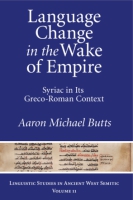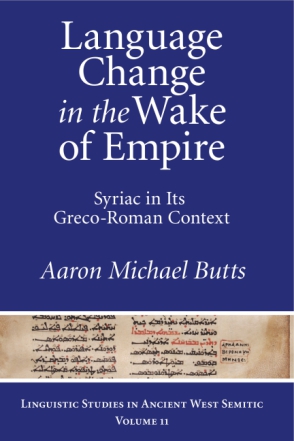Language Change in the Wake of Empire
Syriac in Its Greco-Roman Context
Aaron Michael Butts
It is well documented that one of the primary catalysts of intense language contact is the expansion of empire. This is true not only of recent history, but it is equally applicable to the more remote past. An exemplary case (or better: cases) of this involves Aramaic. Due to the expansions of empires, Aramaic has throughout its long history been in contact with a variety of languages, including Akkadian, Greek, Arabic, and various dialects of Iranian. This books focuses on one particular episode in the long history of Aramaic language contact: the Syriac dialect of Aramaic in contact with Greek.
- Description
- Table of Contents
In this book, Butts presents a new analysis of contact-induced changes in Syriac due to Greek. Several chapters analyze the more than eight-hundred Greek loanwords that occur in Syriac texts from Late Antiquity that were not translated from Greek. Butts also dedicates several chapters to a different category of contact-induced change in which Syriac-speakers replicated inherited Aramaic material on the model of Greek. All of the changes discussed in the book are located within their broader Aramaic context and analyzed through a robust contact linguistic framework.
By focusing on the Syriac language itself, Butts introduces new – and arguably more reliable – evidence for locating Syriac Christianity within its Greco-Roman context. This book, thus, is especially important for the field of Syriac studies. The book also contributes to the fields of contact linguistics and the study of ancient languages more broadly by analyzing in detail various types of contact-induced change over a relatively long period of time.
Chapter 1. Introduction
Part 1: Prolegomena
Chapter 2. The Contact Linguistic Framework
Chapter 3. The Sociohistorical Setting
Part 2: Loanwords
Chapter 4. Greek Loanwords in Syriac: The Methodological Framework
Chapter 5. The Phonological Integration of Greek Loanwords in Syriac
Chapter 6. The Morphosyntactic Integration of Greek Loanwords in Syriac
Part 3: Grammatical Replication
Chapter 7. Grammatical Replication: The Methodological Framework
Chapter 8. The Syriac Copula ʾi aw(hy) Replicated on Greek ἐστίν
Chapter 9. The Syriac Conjunctive Particle den Replicated on Greek δέ
Chapter 10. Conclusion
Appendix 1. Greek Loanwords Inherited in Syriac
Appendix 2. Citations for Verbless Clauses Bibliography
Indexes
Index of Authors
Index of Biblical Sources
Index of Syriac Words
Index of Greek Words
Index of Subjects
Mailing List
Subscribe to our mailing list and be notified about new titles, journals and catalogs.




